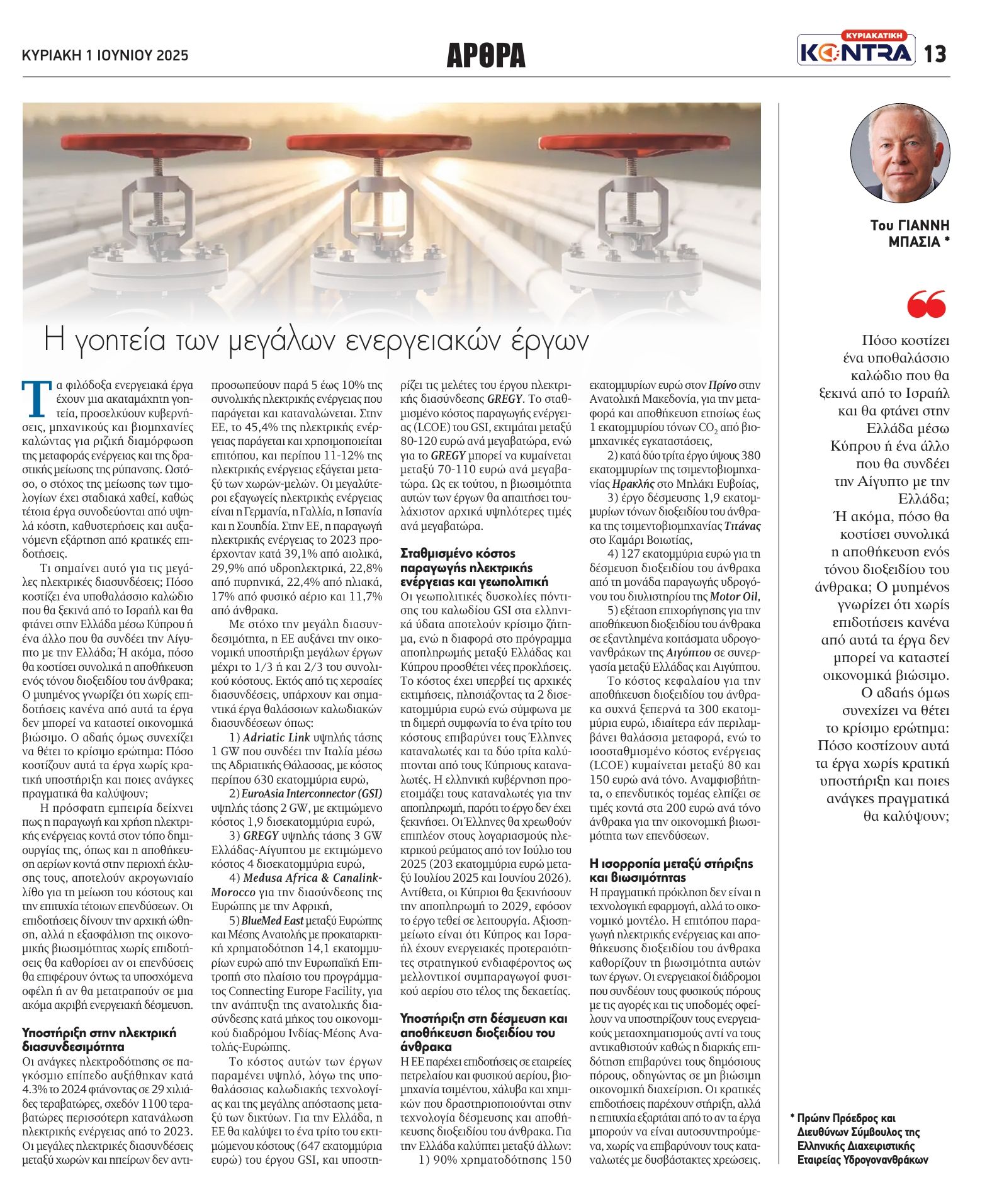The Charm of Large Energy Projects

Subsidies provide the initial push, but ensuring long-term financial viability without them will determine whether these investments deliver their promised benefits or become yet another costly energy commitment.
Support for Electricity Interconnectivity
Global electricity demand rose by 4.3% in 2024, reaching 29,000 terawatt-hours; an increase of nearly 1,100 TWh compared to 2023. Large-scale interconnections between countries and continents are central to this growth, aligning with the objectives of the GREGY electricity interconnection project. The levelized cost of energy (LCOE) for the EuroAsia Interconnector (GSI) is estimated between €80–120 per megawatt-hour, while for GREGY it ranges from €70–110/MWh. As a result, the viability of these projects will initially require higher electricity prices per megawatt-hour. Currently, such interconnections account for only 5–10% of total electricity produced and consumed. In the EU, 45.4% of electricity is generated and used locally, while around 11–12% is traded between member states. The largest electricity exporters in the EU are Germany, France, Spain, and Sweden. In 2023, the EU’s electricity mix consisted of 39.1% wind, 29.9% hydro, 22.8% nuclear, 22.4% solar, 17% natural gas, and 11.7% coal.
To promote greater interconnectivity, the EU is increasing financial support for major infrastructure projects, covering up to one-third or even two-thirds of total costs. In addition to land-based links, several key subsea cable projects are underway:
- Adriatic Link – a 1 GW high-voltage connection between Italy and the Adriatic coast, costing approximately €630 million.
- EuroAsia Interconnector (GSI) – a 2 GW high-voltage link with an estimated cost of €1.9 billion.
- GREGY – a 3 GW high-voltage interconnection between Greece and Egypt, projected at €4 billion.
- Medusa Africa & Canalink Morocco – connecting Europe with North Africa.
- BlueMed East – linking Europe and the Middle East, with €14.1 million in preliminary funding from the European Commission under the Connecting Europe Facility, supporting development along the India–Middle East–Europe economic corridor.
High Costs and Geopolitical Complexities
The cost of these projects remains high due to the challenges of subsea cable technology and the vast distances between networks. For Greece, the EU will cover one-third of the estimated €647 million cost of the GSI project. However, geopolitical hurdles, particularly the laying of the GSI cable in Greek waters, pose a critical issue. Added to this are repayment schedule differences between Greece and Cyprus, which introduce further complications. The total cost has already exceeded initial estimates, approaching €2 billion. According to the bilateral agreement, one-third of the cost will be borne by Greek consumers, while the remaining two-thirds will be covered by Cypriot consumers. The Greek government is preparing its citizens for repayment, even though the project has yet to begin. Greek households will see additional charges on their electricity bills starting in July 2025—amounting to €203 million between July 2025 and June 2026. In contrast, Cypriot consumers will begin repayment in 2029, provided the project becomes operational. Notably, both Cyprus and Israel have identified strategic energy priorities, positioning themselves as future co-producers of natural gas by the end of the decade.
Support for Carbon Capture and Storage (CCS)
The EU provides subsidies to oil and gas companies, as well as to the cement, steel, and chemical industries engaged in carbon capture and storage (CCS) technologies. In Greece, this support includes:
- 90% funding of a €150 million project in Prinos, Eastern Macedonia, for the annual transport and storage of up to 1 million tons of CO₂ from industrial facilities.
- Two-thirds funding of a €380 million project by Heracles Cement in Milaki, Evia.
- A CCS initiative by Titan Cement in Kamari, Boeotia, targeting 1.9 million tons of CO₂.
- €127 million for carbon capture at the hydrogen production unit of the Motor Oil refinery.
- A proposed grant for CO₂ storage in depleted hydrocarbon fields in Egypt, as part of a joint Greece–Egypt initiative.
Capital costs for CO₂ storage often exceed €300 million, especially when offshore transport is involved. The levelized cost of energy (LCOE) for such projects ranges between €80 and €150 per ton, while investors are hoping for carbon prices closer to €200 per ton to ensure economic viability.
Balancing Support and Sustainability
The real challenge lies not in technology itself, but in the economic model. Localized electricity generation and carbon storage are key to the long-term sustainability of these projects. Energy corridors that connect natural resources to markets and infrastructure should support energy transitions, not replace them, since ongoing subsidies strain public finances and risk unsustainable economic management. While government support can provide a crucial boost, the ultimate success of these projects depends on whether they can become self-sustaining without burdening consumers with excessive costs.
Γιάννης Μπασιάς: Η γοητεία των µεγάλων ενεργειακών έργων - KontraNews
"Κυριακάτικη Κόντρα - Έντυπη Εκδοση - Αρθρο - June 1, 2025"
Yannis Bassias – Selected parts translated in English from the original article in Greek
